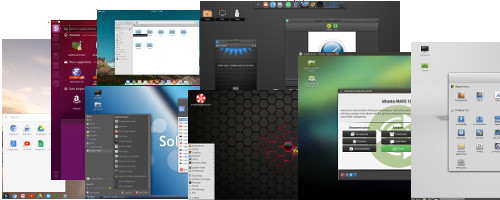The Top 5 Linux Myths
Think about this: Millions of computer users are already using or preparing to switch to Linux because soon, their computers won't be able to cope with Windows, and they cannot afford to upgrade their hardware. Linux is not just their only choice but also their best choice.
Sometimes, though, it's the myths about Linux that stand in the way. In this article we hope to dispel some of those myths.

Myth 1: Linux Is Difficult To Use
Nope, that hasn't been true in years. Linux was originally designed for people with some computer or programming expertise, but nowadays, Linux looks almost identical to Windows, and it is just as easy to use.
In some ways, Linux is a bit easier to use because it seldom crashes or gets infected by malware.
Myth 2: Linux Has Too Few Application Programs
You can use your Linux to attend online classes, speak to friends or family, surf the web, listen to music, watch movies, write documents, do household accounting, and play games.
There are thousands of Linux application programs as good as, or better than, Microsoft or other commercial software. And, as a bonus: the vast majority of them are free.
Myth 3: There Are Too Many Different Linux Versions
Yes, there are many Linux distributions (versions), but they all use the same basic kernels, commands, and programs.
The direct opposite is true of Microsoft Windows. The various Microsoft Windows operating systems (like Windows 95, 7, ME, NT, CE, 2000, XP, 10, and 11) are not alike. They resemble each other only superficially. On top of that, each one gets fragmented even further when Microsoft rolls out a new service pack or major patch to fix bugs and security holes.
We usually recommend Ubuntu MATE and Linux Mint for new switchers from other operating systems because they focus on leveraging Linux commonalities to make it easy to switch. Understanding the key differences between distributions can help you make your own choice by looking at some of those differences, so we wrote this article, "What Are The Differences Between Linux Distributions If They Are All Linux?"
Myth 4: Linux Is Obsolete Because It's Old
Linux is based on UNIX which was developed in 1969, and has survived more than 30 years of testing. It is still being tweaked and improved by the best computer scientists worldwide. As you know, Windows 7, 8, 10, 11, and all the rest only ‘live' for a few years before a new system entirely replaces them.
This is due to either technical problems or planned obsolescence to protect income streams.
Myth 5: Linux Is 100% Secure
Linux is actually far more resistant to malicious code than Microsoft Windows because the source code is freely available. Experts worldwide can inspect and test it to find security flaws and write patches as fast as possible. Yet, the threat landscape keeps evolving, and you must stay ahead.
You can take two steps to make your Linux more secure: use antivirus and use a VPN.
Summary
So even though some or all of these myths may have made you hesitate to consider a switch to Linux, now you can make a more informed decision.

